The ladder gave in. Tchicaya gripped the bottom end firmly while a wave of deformation swept along the length of the device. As the side rails stretched, material was redistributed into new rungs. In its final shape, paper-thin, the ladder was still a meter too short to touch the edge of the roof, but it would bring it within reach.
Mariama said, "After you."
Tchicaya had planned to follow her up, so he’d have a chance to catch her if she slipped, but he’d been assuming that she’d demand to go first anyway, so he had no argument prepared. He mounted the ladder and began to ascend. He didn’t need to look down to know when she’d joined him; he could feel the structure vibrating with a second load.
If she did fall and injure herself, she could retreat at will into the painless world of her Qusp. An accident would mean discovery and shame, but no great suffering. Yet Tchicaya’s hands shook at the thought of it, and he could not imagine feeling differently. The structure of his mind had been passed down with only a few small modifications from the original human form, shaped by evolution in the Age of Death, leaving him with the choice between embracing its impulses in all their absurdity — like ancient figures of speech whose literal meaning bore no resemblance to anything people still did — or struggling to invent a whole new vocabulary to replace them. If you cared about someone, what could replace the sick feeling of the misery you’d feel if they came to harm? The bodiless, he knew, had found their own, varied answers, but the idea that he might one day do the same made him giddy.
He peered down.
Mariama said, "What?"
"Nothing."
The long climb was far easier than it had been the night before, but Tchicaya found the act of reaching back to grab hold of the gutter a lot more disconcerting while perched on the top rung of the ladder than when he’d gripped the drainpipe firmly with his legs. He hoisted himself up and clambered onto the roof, then moved away from the edge quickly so he wouldn’t be in Mariama’s way. Seconds later, she was beside him.
"We should have used ropes, and grappling hooks," she said. "Like they do on mountains."
"I never thought of that," Tchicaya admitted.
"I was joking."
"It might have been fun, though." It might have been safer.
"Are you going to let me in on the big secret now?"
Tchicaya feigned indifference. "I did warn you: there’s probably nothing to see." He aimed the lamp’s beam across the roof, but deliberately kept it low. "This way."
They crossed the tiles together in silence. When they reached the radiator, Tchicaya showed her the patch of iridescent film he’d discovered the night before.
Mariama examined it. Tchicaya had half-expected her to identify the substance immediately, puncturing his fantasy with a far simpler explanation, but she was as baffled as he was. When he showed her how the film responded to the lamplight, she said, "Is that why you thought there’d be nothing here? You expected the sunlight to destroy it?"
"No. This surface ought to be in the shade all day."
"It would still get some light from the sky, though."
"That’s true," he conceded. "But if it was there last night, it either had to be able to survive that much indirect sunlight, or it had to have formed after sunset, at least once. So why wouldn’t it be here again?"
Mariama nodded patiently. "All right. So what were you warning me not to expect?"
Tchicaya’s throat tightened. "I scraped some off, and put it on another fin. One that should have been about equally shaded. To see if it would…" He couldn’t say the word.
"To see if it would grow?"
He nodded stupidly.
Mariama whooped with delight. "Where!" She clutched at the lamp, but when he held on to it she didn’t fight him for it. Instead, she took hold of his arm and said, "Will you show me? Please?"
They stumbled around the radiator, helping each other stay balanced. Tchicaya told himself he didn’t care what they found; when there turned out to be nothing, they could laugh at his grandiose delusions together.
"This is the one." He aimed the lamp into the wedge-shaped space between the fins, but he couldn’t hold it still. "Do you see anything?"
Mariama put an arm around him, steadying his whole body to steady the lamp.
There was a patch of the film in front of them, an oval about the size of his hand, at exactly the height where he would have scraped the knife clean.
Mariama took the lamp, and knelt to inspect the patch more closely. It began to shrink immediately; she pulled the light away.
"This wasn’t here last night?"
"No."
"So it must be a new…" She struggled for the right word.
"Colony? Do you think that’s what it is?"
"I don’t know."
She turned to him. "But it is alive? It has to be!"
Tchicaya was silent for a moment. He’d thought the result would settle the issue, but now he was having second thoughts. The evidence was still too flimsy to support the extraordinary conclusion. "There are chemicals that do some strange things," he said. "I’m not sure what this proves."
Mariama rose to her feet. "We have to wake someone, and show them. Right now."
Tchicaya was horrified. "But then they’ll know what we did.
They’ll know we broke Slowdown."
"No one will care. Don’t you know how rare this is?"
He nodded. "But you promised me — "
Mariama laughed. "We’re not going to be in trouble! This is a thousand times more important!"
Apart from Earth itself, native life had only been found on three worlds. Simple and microbial, but in each case unique. Every biosystem used different chemistry, different methods of gathering energy, different structural units, different ways of storing and transmitting information. On the crassest, most pragmatic level, this knowledge might be of little value: technology had long ago surpassed nature’s ability to do all of these things efficiently. But each rare glimpse at a separate accident of biogenesis cast light on the nature and prospects of life. The roof of this building would become the most talked-about location for a hundred light-years.
Tchicaya said, "What if it’s something we brought ourselves? That wouldn’t be much of a discovery."
"Such as what? Nothing we brought can mutate freely: every cell in every crop, every cell in our bodies, has fifty different suicide enzymes that kill off the lineage at the first genetic error. This could no more be ours than if they found some strange machine out in the ice that nobody owned up to making."
Tchicaya was growing tired of trying to keep his balance on the sloping roof; he sat down, his back slumped against the fin. It was lukewarm, body temperature. Once Slowdown ended, it would be hotter than the boiling point of water. So which extreme did the native life favor ? Had it grown here before the Slowdown, and then managed to cling on in the relative cool? Or had it blown out of the icy wastes and only colonized the radiator once the Slowdown had rendered this tiny niche benign?
Mariama sat beside him. "We’ll have to leave," she said.
"Can’t that wait until morning?"
"I don’t mean us, now. We’ll have to leave Turaev. They’ll evacuate the planet . We’ll all have to go somewhere else." She smiled, and added with a kind of mock jealousy, "I always wanted to be the one to shake this place out of its stupor. But it looks as if you’ve beaten me to it."
Tchicaya sat motionless, scowling slightly. The words refused to sink in. He knew that she was right: it was a universal principle, accepted by every space-faring culture. In each of the other three cases, the planet in question had been strictly quarantined and left to its own fate. Only one of those worlds had been settled, though. Native life was supposed to have been ruled out, long before the colonists' first spores were launched. However microscopic, and however sparsely distributed, it should have left some detectable chemical signature in the atmosphere.
Читать дальше
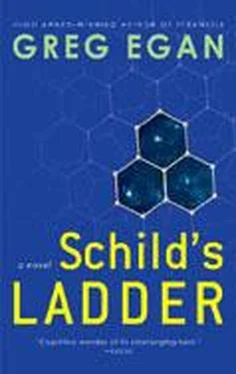
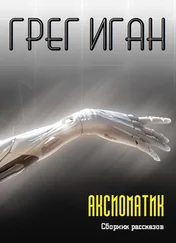
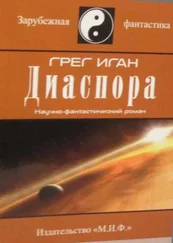
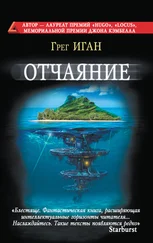
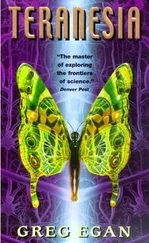
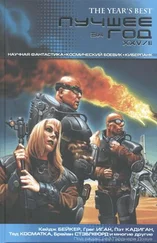
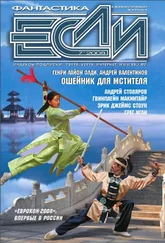

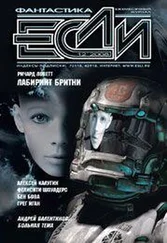
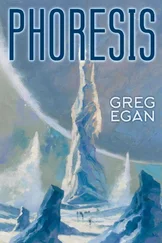
![Грег Иган - Рассказы [компиляция]](/books/419837/greg-igan-rasskazy-kompilyaciya-thumb.webp)
